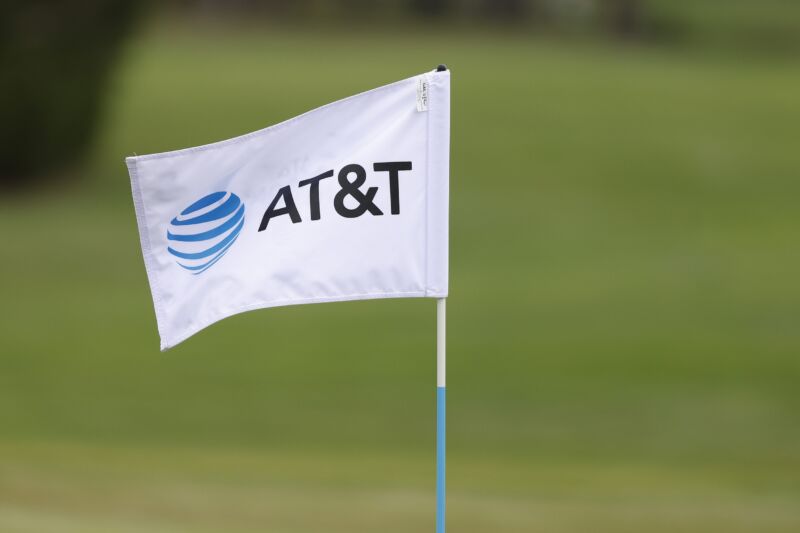
AT&T and other entities are trying to block the SpaceX/T-Mobile plan to provide Starlink satellite service directly to cell phones.
In a filing yesterday, AT&T urged the Federal Communications Commission to reject the SpaceX/T-Mobile proposal. "The FCC's rules do not permit SpaceX's proposed use of T-Mobile's terrestrial spectrum, and Applicants fail to even request—much less justify—rule waivers that would be necessary to authorize their proposed SCS [supplemental coverage from space] authorizations," AT&T said.
AT&T said it is interested in the proceeding because it has a license to use adjacent spectrum in the PCS C Block. AT&T says the SpaceX/T-Mobile plan, which was announced in August 2022, could "jeopardize or inhibit the delivery of terrestrial wireless services," including mobile broadband.
SpaceX and T-Mobile's "technical showings are woefully insufficient regarding the risk of harmful interference posed by their planned SCS deployments," AT&T told the FCC. "SpaceX and T-Mobile's applications fall far short of meeting the threshold for waiver and cannot be granted in their current state."
Plan affects up to 7,500 satellites
The FCC last month sought comment on the application, noting that SpaceX requested modification of its license for low-orbit Earth satellites "to add a direct-to-cellular communications capability on up to 7,500 Gen2 Starlink satellites." The links to consumer devices would rely on the 1910-1915 MHz (Earth-to-space) and 1990-1995 MHz (space-to-Earth) bands, also known as PCS G-Block, the FCC said.
The FCC is on board with satellite companies and mobile carriers partnering to close gaps in wireless networks. In a March action, the FCC proposed a new regulatory framework to help satellite operators and wireless companies "leverage the growth in space-based services to connect smartphone users in remote, unserved, and underserved areas." But the FCC could still reject or require changes to the SpaceX/T-Mobile plan.
We contacted SpaceX and T-Mobile today and will update this article if we get any response.
SpaceX said recently that it plans to start testing the satellite-to-cell system with T-Mobile sometime this year. Text messaging is expected to be the first supported service, with voice and Internet coverage to be added later.
Rural wireless group has similar objections
The SpaceX/T-Mobile docket also drew responses yesterday from the Rural Wireless Association, a trade group for small, rural wireless carriers, and Omnispace, which is partnering with Ligado for a satellite-to-phone system.
The RWA told the FCC it is concerned "that T-Mobile's and SpaceX's proposed operations may cause adjacent channel interference to licensees' mobile and fixed network operations in the 1895-1910 MHz and 1975-1990 MHz bands ('PCS C-Block') in rural and remote areas."
SpaceX told the FCC that its "direct-to-cellular system will operate without causing harmful interference to or requiring protection from any other service duly licensed in these bands" and "will protect adjacent band operations from harmful interference."
But according to the RWA, "SpaceX offers no support for this conclusion nor does it offer to put any protections in place to ensure there is no adjacent channel interference." SpaceX and T-Mobile also have not "provided the results of any field trials that would allow the public to analyze the potential for adjacent channel interference," the rural wireless group said. Omnispace similarly told the FCC that the SpaceX/T-Mobile plan would interfere with existing mobile-satellite service networks.
One other opposition filing came in two weeks ago from the National Radio Astronomy Observatory, a government-funded research center. The group said the SpaceX/T-Mobile plan would cause harmful interference in portions of the National Radio Quiet Zone. SpaceX issued a response saying that the astronomy group's concerns "appear more appropriately addressed in the Commission's general rulemaking to establish industry-wide rules for SCS."
The FCC sided with SpaceX in a separate battle over spectrum use yesterday. As we reported, the FCC rejected a Dish Network proposal for mobile service in the 12.2-12.7 GHz band, saying the Dish plan would cause harmful interference to satellite broadband service.
reader comments
103